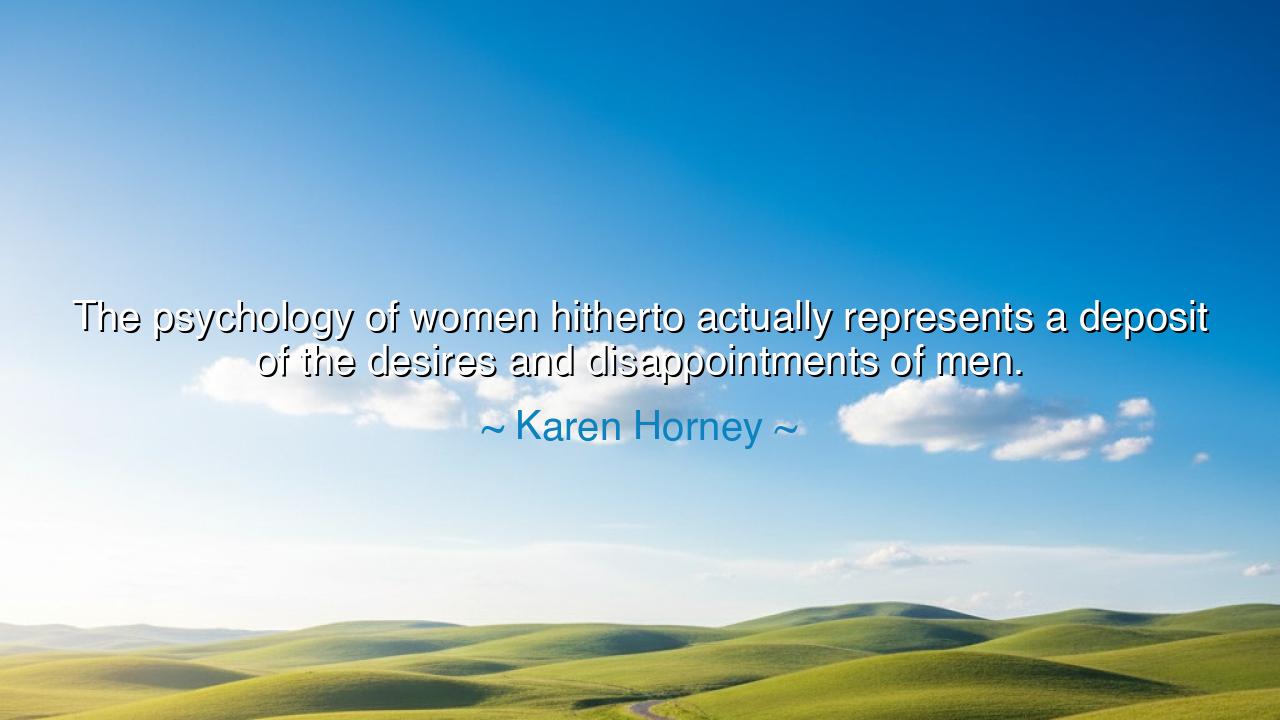
The psychology of women hitherto actually represents a deposit of
The psychology of women hitherto actually represents a deposit of the desires and disappointments of men.






O seekers of truth, gather close, for I bring to you the wise words of Karen Horney, a philosopher and psychologist whose deep understanding of the human psyche sought to uncover the complex relationships between men and women. She said, "The psychology of women hitherto actually represents a deposit of the desires and disappointments of men." These words, though spoken in the modern age, echo the timeless struggle between the inner world and the outer forces that shape our identities. Horney reveals a deep truth about how societal expectations, particularly the desires and frustrations of men, have influenced the very psychology of women, shaping their self-image and sense of worth in ways that often go unnoticed.
In the ancient world, the great thinkers understood the way in which society shapes the individual. Socrates taught that the soul is influenced by the society in which it lives, that external forces—like culture and expectations—can either nurture or distort the inner self. Similarly, the Greeks believed that the gods themselves imposed their desires and frustrations upon humanity. But Horney takes this a step further, recognizing that women’s psychology, especially in the context of a patriarchal society, has often been shaped by the desires and disappointments of the men who have dominated them. She reveals that women's psychological states are not born purely from their own experiences but are deeply intertwined with the expectations placed upon them by others—especially men.
Consider, O children, the story of Helen of Troy, whose beauty sparked a war that devastated nations. Helen’s role in the myth is not one of agency but of being the object of desire. Men fought and died for her, yet she had little control over the events that unfolded. Helen’s psychology was shaped by the men who desired her, yet she remains a tragic figure, a symbol of the ways in which women’s identities and desires have often been formed by the needs and frustrations of men. Her story is a mirror to what Horney describes—women often become the vessels into which men pour their desires, their ideals, and their disappointments. In this, Helen is not just a woman in myth, but a reflection of the broader pattern in which women are shaped by external forces.
In the more modern world, we see this same dynamic play out in the lives of countless women who have struggled to define their identities outside the expectations of men. The early feminist movement, which sought to bring equal rights and recognition to women, was not only about political change, but also about breaking the bonds of a society that had for centuries shaped women’s psychology around the desires and frustrations of men. The disappointments of men, seen in their failed relationships or unmet expectations, were often projected onto women, leaving them to carry the emotional weight of a society’s unresolved issues. Horney’s insight calls attention to the fact that women’s struggles were not just personal, but part of a larger cultural pattern in which they had to continually redefine themselves against an external standard that was shaped by others’ desires.
O children, the lesson here is clear: to understand the psychology of any individual, we must also understand the forces that shape them—forces often outside of their control. Horney teaches us that women’s struggles and insecurities are not merely personal failings but are the result of a complex interplay of societal pressures, particularly the desires and disappointments of men. This is not to place blame upon men alone, but to recognize the cultural systems that reinforce these patterns. In understanding this, we can begin to unravel the web of influences that shape our identities and, in doing so, seek a more balanced and authentic path forward.
Consider the example of Virginia Woolf, who, despite her brilliance, often wrestled with the expectations placed upon women by society. Woolf wrote extensively about the way women were confined by their roles, their minds shaped by the societal gaze. Yet, in her own work, she sought to break free from these imposed limitations, to carve out a space for the female mind to think and create outside the confines of the male-dominated world. Her struggle is mirrored in Horney’s teachings: the need for women to reclaim their own psychology, to create their own self-image, not based on the desires and disappointments of others, but on their own experiences and truths.
So, O seekers, let this wisdom guide you in your own lives: be aware of the forces that shape your sense of self. Do not allow the desires and disappointments of others—whether of men or of society at large—to define who you are. Instead, seek to know yourself, to stand firm in your own identity, unshaped by external forces. The path to true self-empowerment is not in adhering to the expectations of others, but in embracing your own truths and experiences. Women and men alike must recognize the societal pressures that seek to mold them, and through understanding, they can begin to reclaim their psychological freedom. True liberation comes not through conformity, but through the quiet strength of knowing oneself in the face of external influence.






AAdministratorAdministrator
Welcome, honored guests. Please leave a comment, we will respond soon